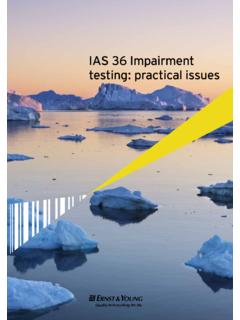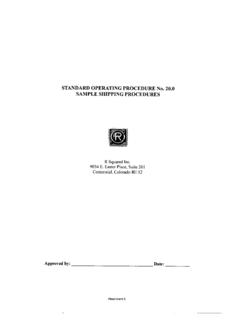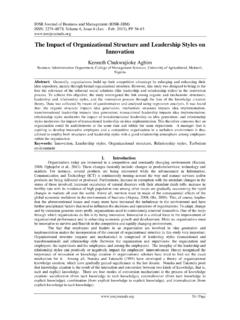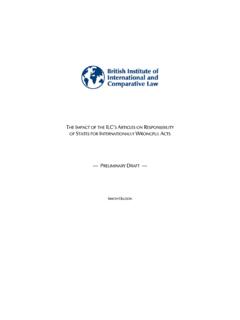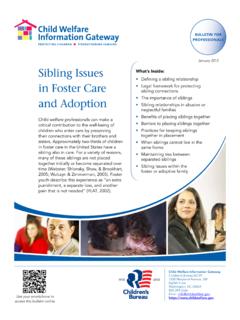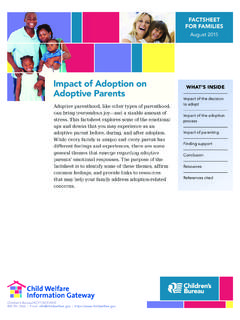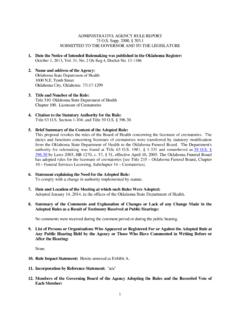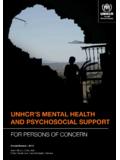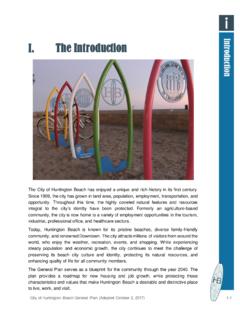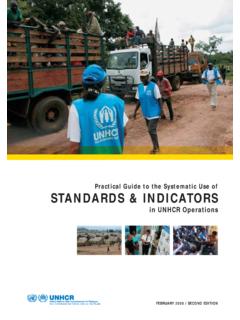Transcription of COLORADO REVISED STATUTES TITLE 24 …
1 COLORADO REVISED STATUTES TITLE 24 GOVERNMENT STATE : ADMINISTRATION ARTICLE 4 Rule-making and Licensing Procedures by State Agencies 24-4-101. Short article shall be known and may be cited as the "State Administrative Procedure Act". Legislative general assembly finds that an agency should not regulate or restrict the freedom of any person to conduct his or her affairs, use his or her property, or deal with others on mutually agreeable terms unless it finds, after a full consideration of the effects of the agency action, that the action would benefit the public interest and encourage the benefits of a free enterprise system for the citizens of this state.
2 The general assembly also finds that many government programs may be adopted without stating the direct and indirect costs to consumers and businesses and without consideration of such costs in relation to the benefits to be derived from the programs. The general assembly further recognizes that agency action taken without evaluation of its economic impact may have unintended effects, which may include barriers to competition, reduced economic efficiency, reduced consumer choice, increased producer and consumer costs, and restrictions on employment.
3 The general assembly further finds that agency rules can negatively impact the state's business climate by impeding the ability of local businesses to compete with out-of-state businesses, by discouraging new or existing businesses from moving to this state, and by hindering economic competitiveness and job creation. Accordingly, it is the continuing responsibility of agencies to analyze the economic impact of agency actions and reevaluate the economic impact of continuing agency actions to determine whether the actions promote the public interest.
4 24-4-102. used in this article, unless the context otherwise requires: (1) "Action" includes the whole or any part of any agency rule, order, interlocutory order, license, sanction, relief, or the equivalent or denial thereof, or failure to act. Any agency rule, order, license, sanction, relief, or the equivalent or denial thereof which constitutes final agency action shall include a list of all parties to the agency proceeding and shall specify the date on which the action becomes effective.
5 (2) "Adjudication" means the procedure used by an agency for the formulation, amendment, or repeal of an order and includes licensing. (3) "Agency" means any board, bureau, commission, department, institution, division, section, or officer of the state, except those in the legislative branch or judicial branch and except: (a) State educational institutions administered pursuant to TITLE 23 (except articles 8 and 9, parts 2 and 3 of article 21, and parts 2 to 4 of article 30), ; (b) The COLORADO law enforcement training academy created in part 3 of article of this TITLE .
6 And (c) The adjutant general of the national guard, whose powers and duties are set forth in section 28-3-106, ( ) "Aggrieved", for the purpose of judicial review of rule-making, means having suffered actual loss or injury or being exposed to potential loss or injury to legitimate interests including, but not limited to, business, economic, aesthetic, governmental, recreational, or conservational interests. (4) "Counsel" means an attorney admitted to practice before the supreme court of this state.
7 (5) "Decision" means the determinative action in adjudication and includes order, opinion, sanction, and relief. ( ) "Economic competitiveness" means the ability of the state of COLORADO to attract new business and the ability of the businesses currently operating in COLORADO to create new jobs and raise productivity. (6) "Initial decision" means a decision made by a hearing officer or administrative law judge which will become the action of the agency unless reviewed by the agency.
8 ( ) "Interested person" includes any person who may be aggrieved by agency action. ( ) "Legislative committees of reference" means the committees established by the rules of the house of representatives and rules of the senate of the general assembly having jurisdiction over subject matter regulated by state agencies. (7) "License" includes the whole or any part of any agency permit, certificate, registration, charter, membership, or statutory exemption. (8) "Licensing" includes the procedure used by an agency respecting the grant, renewal, denial, revocation, suspension, annulment, limitation, or modification of a license.
9 (9) "Opinion" means the statement of reasons, findings of fact, and conclusions of law in explanation or support of an order. (10) "Order" means the whole or any part of the final disposition (whether affirmative, negative, injunctive, or declaratory in form) by any agency in any matter other than rule-making. (11) "Party" includes any person or agency named or admitted as a party, or properly seeking and entitled as of right to be admitted as a party, in any court or agency proceeding subject to the provisions of this article.
10 (12) "Person" includes an individual, limited liability company, partnership, corporation, association, county, and public or private organization of any character other than an agency. (13) "Proceeding" means any agency process for any rule or rule-making, order or adjudication, or license or licensing. (14) "Relief" includes the whole or any part of any agency grant of money, assistance, license, authority, exemption, exception, privilege, or remedy; recognition of any claim, right, immunity, privilege, exemption, exception, or remedy; or any other action upon the application or petition of, and beneficial to, any person.
